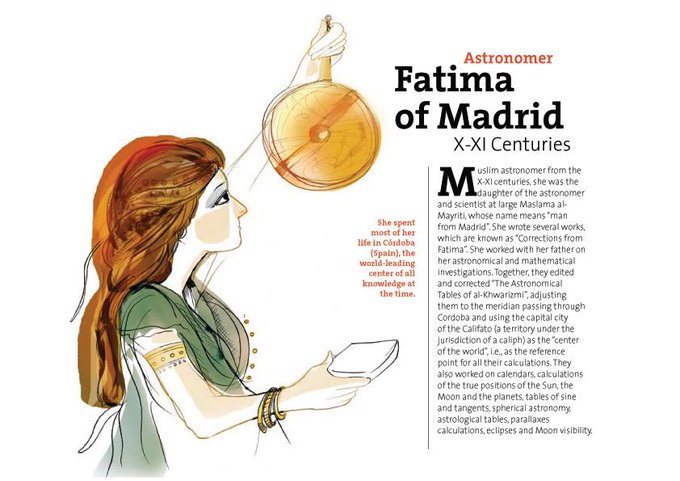“By focusing attention, observation, and extensive thought on astronomical phenomena, one is able to prove the unicity of God and to recognize the extent of the Creator’s might as well as His wide wisdom and delicate design.”
– Al-Battani (850-929), Astronomer & Mathematician
In his book Taḥdīd al‐amākin, Bīrūnī mentions a lunar eclipse of 997 that he observed in Khwārizm, having arranged a simultaneous observation with Abū al‐Wafāʾ al‐Būzjānī who was residing in Baghdad. Bīrūnī's aim was to find the difference in longitude of the two cities.
Muslim Astronomer Fátima of Madrid (10th-century)
She spent most of her life in Córdoba, the world-leading center for all knowledge at the time. Fátima corrected "The Astronomical Tables of Al-Khawarizmi". She also worked on calendars, eclipses and Moon visibility 🌒…
"Illustrious Muslim scientists of the golden age, particularly Ibn Al-Haytham (965-1040) and Al-Biruni (973-1048), insisted on natural explanations for the phenomena they were attempting to explain."
~ Nidhal Guessoum
🔗https://t.co/N1bY5hKbbt
Al-Razi, 9th-century polymath, known as "Hippocrates of the Arabs"
👉He made one of earliest serious attempts to classify the chemical ⚗️ elements,
👉was an early proponent of the scientific method,
👉and even carried out one of the first clinical trials.
“By focusing attention, observation, and extensive thought on astronomical phenomena, one is able to prove the unicity of God and to recognize the extent of the Creator’s might as well as His wide wisdom and delicate design.”
– Al-Battani (850-929), Astronomer & Mathematician
"Illustrious Muslim scientists of the golden age, particularly Ibn Al-Haytham (965-1040) and Al-Biruni (973-1048), insisted on natural explanations for the phenomena they were attempting to explain."
Muslim Astronomer Fátima of Madrid (10th-century)
She spent most of her life in Córdoba, the world-leading center for all knowledge at the time. Fátima corrected "The Astronomical Tables of Al-Khawarizmi". She also worked on calendars, eclipses and Moon visibility…
Al-Biruni (about 1,000 years ago) measured the circumference of the Earth 🌍 with an accuracy of 99.7% compared to today’s accepted value.
Al-Razi, 9th-century polymath, known as "Hippocrates of the Arabs"
👉He made one of earliest serious attempts to classify the chemical ⚗️ elements,
👉was an early proponent of the scientific method,
👉and even carried out one of the first clinical trials.














